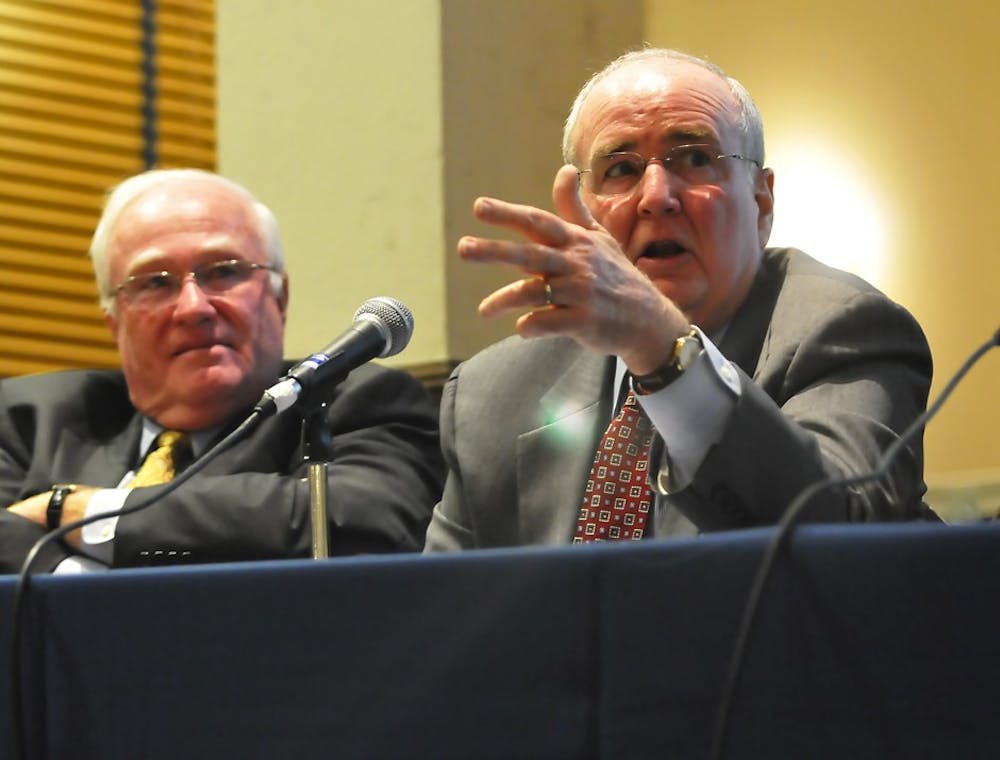
As America’s national pastime, baseball has always brought communities together — an idea discussed by an esteemed panel Thursday on Penn’s campus.
A large group of students, faculty and baseball enthusiasts filled Houston Hall’s Bodek Lounge to discuss the importance of baseball parks in revitalizing communities. The panel included Phillies President and CEO David Montgomery, a 1968 College graduate and 1970 Wharton MBA recipient.
The event, “Ballparks as Urban Anchors,” was sponsored by the Penn Institute for Urban Research, PennDesign’s Department of City and Regional Planning, Wharton Sports Business Initiative and the Provost’s Office Year of Games.
“Ballparks do play an important role in the revitalization of the physical surroundings of the community but also in developing the spirit of people,” said Eugenie Birch, event moderator and co-director of the Penn Institute for Urban Research.
Robert DuPuy, former president and COO of Major League Baseball, called the event “a terrific opportunity” to explore baseball as “a social institution,” specifically how stadiums help build communities.
Edward Cohen, principal owner of the Washington Nationals, began the discussion by demonstrating the change that has occurred with the opening of Nationals Park in 2008.
“It was an area of dance clubs and tattoo parlors … where you would get your car inspected,” he said. “[The ballpark] has totally cleaned up the entire area.”
Montgomery explained how Citizens Bank Park, the Phillies’ home since 2004, came to fruition based on the success of newer ballparks like Camden Yards in Baltimore.
“When we saw that the ballpark can change a community, we were open to moving,” Montgomery said. One of the ideas was to move to what is now Penn Park, but after this was turned down, the comfort level of the actual ballpark itself became the priority.
Irwin Raij, a partner at Foley & Lardner, looked at the issue from an economic angle.
“I believe that public investment in ballparks is beneficial for communities,” he said. When he sees ballparks being built, using the Orange Bowl as an example, he sees thriving communities and believes that “the public sector should get engaged and involved.”
Montgomery added that methods such as property and alcohol taxes can benefit the city and also allow teams to be more economically independent of the public sector. There are always incentives in updating or building new ballparks.
“If we can elevate fan experience, fans will come back,” said Gregory Sherlock, principal at the design firm, Populous. “Experience is an emotional thing that is a connection to the game.”
“Fans live and die by their teams,” DuPuy said. “Fans take great pride in the facility as well. It’s part of the community.”
It is not just a ballpark that has the ability to bring the community together, but also baseball as an institution, especially the players.
“[The nucleus of the Phillies] has been there long enough that people in this community can identify with them,” Montgomery said.
“Players today are much more devoted to fans and the community,” DuPuy added. “I am very proud of what baseball has done.”
Ultimately, before the question-and-answer session, the focus of the discussion was brought back to the importance of the city.
“Philadelphia is our first name,” Montgomery said. “We’re going to ask our young players to get involved in their communities.”
The discussion ended with the panelists sharing their favorite memories from careers in the baseball industry. The majority discussed seeing the public experience the joy of the ballpark and baseball games.
In the end, “everyone remembers the joy of their first major league baseball game,” DuPuy said. “They don’t remember their first time in a convention center.”
The Daily Pennsylvanian is an independent, student-run newspaper. Please consider making a donation to support the coverage that shapes the University. Your generosity ensures a future of strong journalism at Penn.
DonatePlease note All comments are eligible for publication in The Daily Pennsylvanian.




